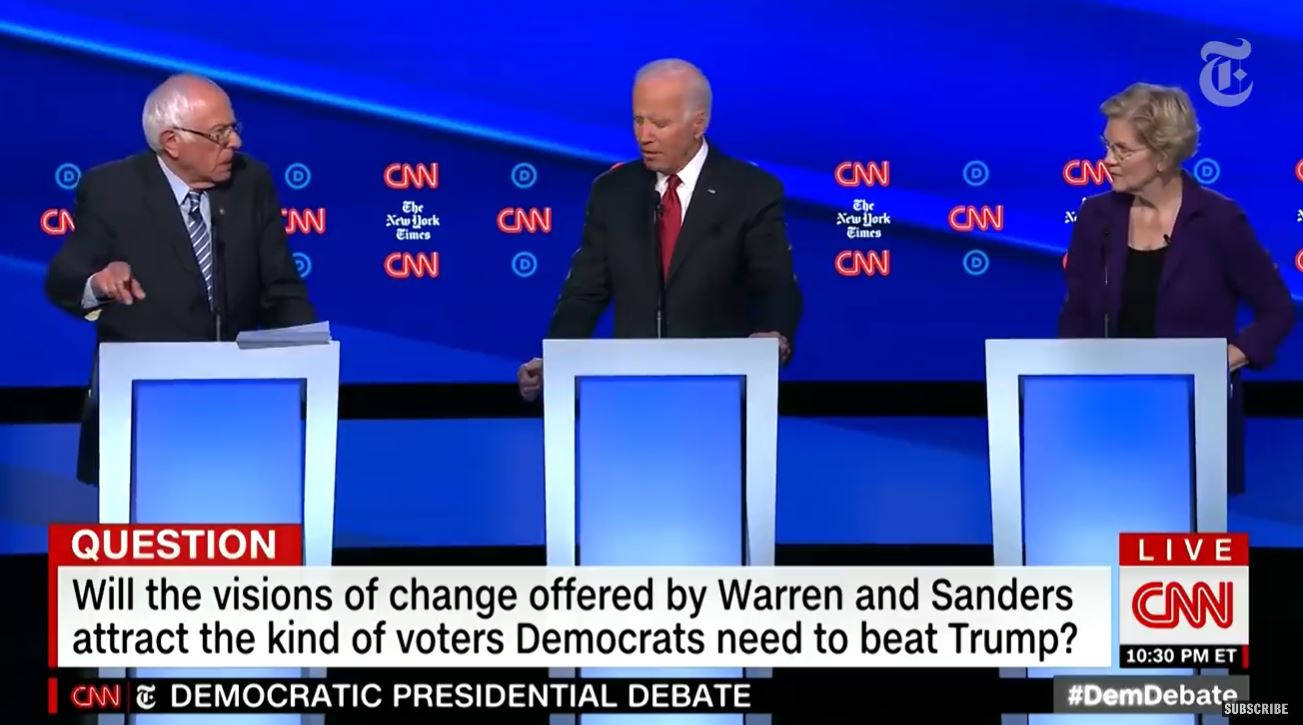The largest number of candidates to date filled the stage at Otterbein University in Westerville, Ohio, for the fourth Democratic presidential debate last night. They offered a number of statements and assessments that bear further scrutiny.
1. Which will benefit workers more: A Universal Basic Income or $15 minimum wage?
Senator Cory Booker: I hope that my friend, Andrew Yang, will come out for this – doing more for workers than UBI [Universal Basic Income] would actually be just raising the minimum wage to $15 an hour. It would put more money in people’s pockets than giving them $1,000 a month.
The Congressional Budget Office’s analysis found that the raising the minimum wage to $15 an hour would give impoverished Americans who keep their jobs an extra $600 a year. It would also cost the wealthiest Americans $700 a year. The “Raise the Wage” Act would also cost an estimated 1.3 to 3.7 million American jobs, reducing those workers’ income to zero, the CBO found.
However, it’s not clear that a UBI does “more for workers.” An experiment in Finland concluded that a UBI failed to stimulate employment among those who received a check.
2. Trade destroyed more U.S. jobs than automation
Sen. Elizabeth Warren: The data show that we’ve had a lot of problems with losing jobs, but the principal reason has been bad trade policy. The principal reason has been a bunch of corporations, giant multinational corporations who’ve been calling the shots on trade.
Warren had previously written that blaming automation for U.S. job losses is “a good story, except it’s not really true.”
Automation accounts for almost 88 percent of all manufacturing job losses between 2000 and 2010, according to a report from Ball State University. The remaining 13 percent of job losses came from trade.
3. Will Bernie Sanders create 35 million new jobs?
Sen. Bernie Sanders: We could put 15 million people to work rebuilding our roads, our bridges, our water systems, our wastewater plants, airports, et cetera. Furthermore — and I hope we will discuss it at length tonight — this planet faces the greatest threat in its history from climate change. And the Green New Deal that I have advocated will create up to 20 million jobs as we move away from fossil fuel to energy efficiency and sustainable energy.
The Green New Deal would have a net negative impact on U.S. jobs.
The 20 million “new” jobs produced would come at the price of private sector jobs. Nicholas Loris of the Heritage Foundation explained the Green New Deal’s impact on employment best:
Granted, a massive tax-and-spend program will “create” jobs by building wind turbines, installing solar panels and building electric vehicles. Yet government spending does not actually create jobs; it merely shifts resources to politically connected sectors of the economy and away from more productive uses. Overall, the number of jobs destroyed would far outweigh any subsidized jobs created.
Sanders’ estimate does not include jobs directly destroyed by the Green New Deal. The GND would end all air travel and shutter the fossil fuel industry. Estimated job losses vary. “Most if not all of the $1.5 trillion in annual U.S. economic activity directly or indirectly attributable to the airline industry would disappear,” writes Dan Reed at Forbes. “Airlines For America, the airline industry’s lobby group claims that U.S. airlines are directly or indirectly responsible for more than 10 million jobs.” Similarly, Wayne Wingarden of the Pacific Research Institute writes, “Oil and gas firms support over 10 million jobs across the country — the Green New Deal would eliminate nearly all these positions.” The Chamber of Commerce estimates that eliminating fracking alone would cost 14.8 millionjobs.
Nor does Sanders’ estimate take into account jobs destroyed through the proposal’s inordinate cost. The Green New Deal would cost $93 trillion over 10 years, according to the American Action Forum. The GND would demand 35 percent of GDP, in addition to existing federal spending, which demands another 20 percent of GDP. Together with state and local government spending, government already consumes more than 35 percent of GDP.
A Green New Deal would in which the government demands 70 cents of every dollar produced in the United States cannot help but negatively impact investment and private-sector growth.
4. Bernie Sanders more than doubled the number of homeless on U.S. streets.
Sen. Bernie Sanders: You have a half-a-million Americans sleeping out on the street today.
Sen. Sanders well overstated the number of people living on the street. While the U.S. Department of Housing and Urban Development (HUD)’s single-night survey found that 552,830 people could be “counted as homeless in the United States” in January 2019, only “194,467 (35 percent) were unsheltered” – or living on the streets. The remaining 358,363 (65 percent) “were sheltered” in temporary housing. (For more facts on homelessness in America, see this article.)
5. The president shouldn’t choose big corporations to break up.
Beto O’Rourke: [W]e will be unafraid to break up big businesses if we have to do that, but I don’t think it is the role of a president or a candidate for the presidency to specifically call out which companies will be broken up. That’s something that Donald Trump has done, in part because he sees enemies in the press and wants to diminish their power. It’s not something that we should do.
True. The Constitution – in Article I, Section 9, paragraph 3 – prohibits the government from passing a Bill of Attainder, which would declare someone guilty of breaking a law without a trial. Then again, “Antitrust doctrine is not embodied in constitutional text,” as Alden Abbott, who now serves as general counsel of the Federal Trade Commission (FTC), has written.
—
This article was republished with permission from the Action Institute.
[Image Credit: YouTube]
















Leave a Comment
Your email address will not be published. Required fields are marked with *